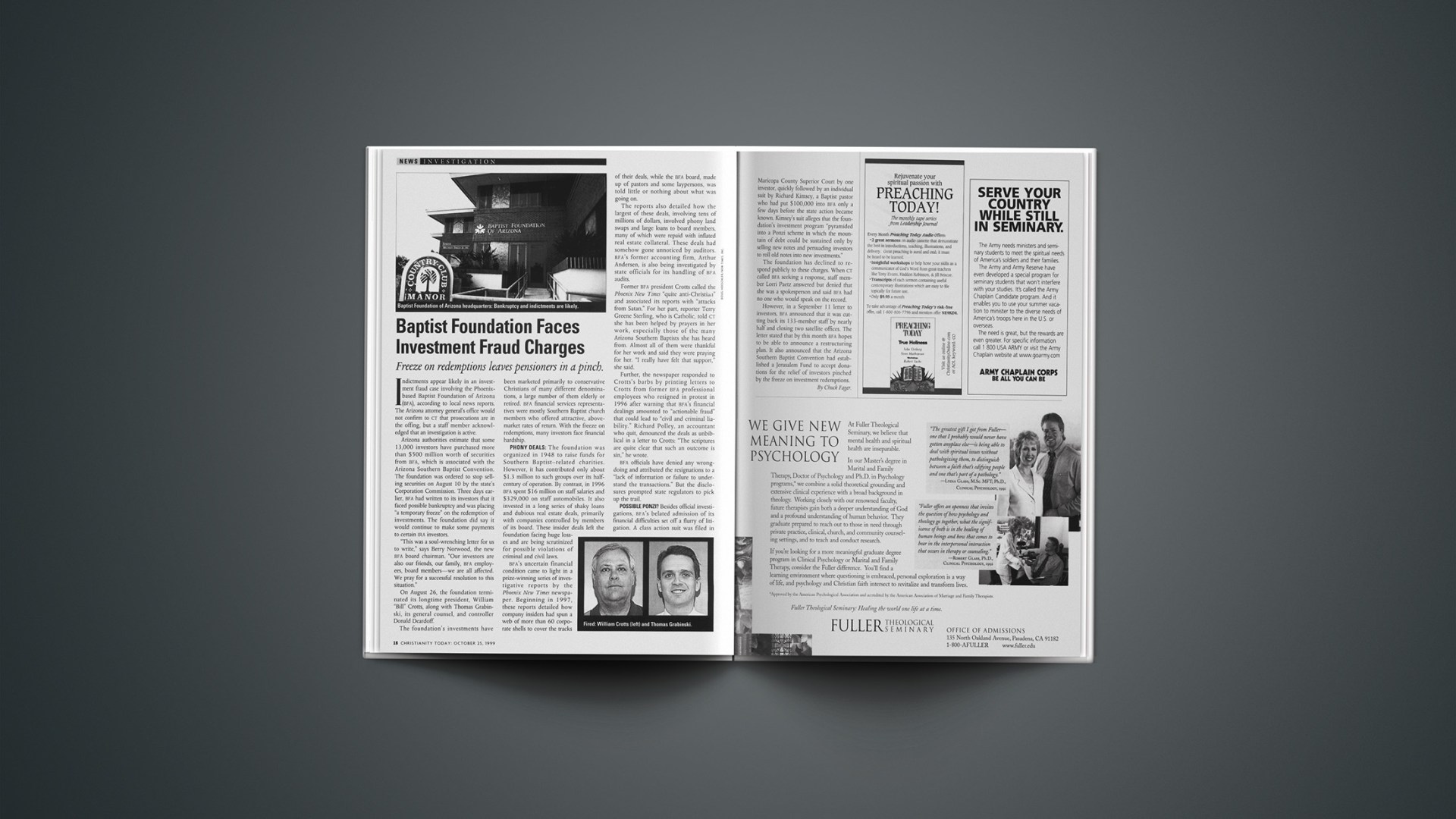Indictments appear likely in an investment fraud case involving the Phoenix- based Baptist Foundation of Arizona (BFA), according to local news reports. The Arizona attorney general’s office would not confirm to CT that prosecutions are in the offing, but a staff member acknowledged that an investigation is active.
Arizona authorities estimate that some 13,000 investors have purchased more than $500 million worth of securities from BFA, which is associated with the Arizona Southern Baptist Convention. The foundation was ordered to stop selling securities on August 10 by the state’s Corporation Commission. Three days earlier, BFA had written to its investors that it faced possible bankruptcy and was placing “a temporary freeze” on the redemption of investments. The foundation did say it would continue to make some payments to certain IRA investors.
“This was a soul-wrenching letter for us to write,” says Berry Norwood, the new BFA board chairman. “Our investors are also our friends, our family, BFA employees, board members—we are all affected. We pray for a successful resolution to this situation.”
On August 26, the foundation terminated its longtime president, William “Bill” Crotts, along with Thomas Grabinski, its general counsel, and controller Donald Deardoff.
The foundation’s investments have been marketed primarily to conservative Christians of many different denominations, a large number of them elderly or retired. BFA financial services representatives were mostly Southern Baptist church members who offered attractive, above-market rates of return. With the freeze on redemptions, many investors face financial hardship.
PHONY DEALS: The foundation was organized in 1948 to raise funds for Southern Baptistrelated charities. However, it has contributed only about $1.3 million to such groups over its half-century of operation. By contrast, in 1996 BFA spent $16 million on staff salaries and $329,000 on staff automobiles. It also invested in a long series of shaky loans and dubious real estate deals, primarily with companies controlled by members of its board. These insider deals left the foundation facing huge losses and are being scrutinized for possible violations of criminal and civil laws.
BFA’s uncertain financial condition came to light in a prize-winning series of investigative reports by the Phoenix New Times newspaper. Beginning in 1997, these reports detailed how company insiders had spun a web of more than 60 corporate shells to cover the tracks of their deals, while the BFA board, made up of pastors and some lay persons, was told little or nothing about what was going on.
The reports also detailed how the largest of these deals, involving tens of millions of dollars, involved phony land swaps and large loans to board members, many of which were repaid with inflated real estate collateral. These deals had some how gone unnoticed by auditors. BFA’s former accounting firm, Arthur Andersen, is also being investigated by state officials for its handling of BFA audits.
Former BFA president Crotts called the Phoenix New Times “quite anti-Christian” and associated its reports with “attacks from Satan.” For her part, reporter Terry Greene Sterling, who is Catholic, told CT she has been helped by prayers in her work, especially those of the many Arizona Southern Baptists she has heard from. Almost all of them were thankful for her work and said they were praying for her. “I really have felt that support,” she said.
Further, the newspaper responded to Crotts’s barbs by printing letters to Crotts from former BFA professional employees who resigned in protest in 1996 after warning that BFA’s financial dealings amounted to “actionable fraud” that could lead to “civil and criminal liability.” Richard Polley, an accountant who quit, denounced the deals as unbiblical in a letter to Crotts: “The scriptures are quite clear that such an outcome is sin,” he wrote.
BFA officials have denied any wrongdoing and attributed the resignations to a “lack of information or failure to understand the transactions.” But the disclosures prompted state regulators to pick up the trail.
POSSIBLE PONZI? Besides official investigations, BFA’s belated admission of its financial difficulties set off a flurry of litigation. A class action suit was filed in Maricopa County Superior Court by one investor, quickly followed by an individual suit by Richard Kimsey, a Baptist pastor who had put $100,000 into BFA only a few days before the state action became known. Kimsey’s suit alleges that the foundation’s investment program “pyramided into a Ponzi scheme in which the mountain of debt could be sustained only by selling new notes and persuading investors to roll old notes into new investments.”
The foundation has declined to respond publicly to these charges. When CT called BFA seeking a response, staff member Lorri Paetz answered but denied that she was a spokesperson and said BFA had no one who would speak on the record.
However, in a September 11 letter to investors, BFA announced that it was cutting back its 133-member staff by nearly half and closing two satellite offices. The letter stated that by this month BFA hopes to be able to announce a restructuring plan. It also announced that the Arizona Southern Baptist Convention had established a Jerusalem Fund to accept donations for the relief of investors pinched by the freeze on investment redemptions.
Copyright © 1999 Christianity Today. Click for reprint information.










